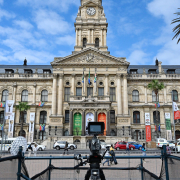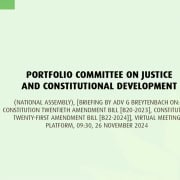|
Getting your Trinity Audio player ready...
|
On Tuesday 13 September 2022, the National Assembly (NA) approved the nomination of Imtiaz Ahmed Fazel as the new inspector-general of intelligence (IGI) of South Africa.
In terms of Section 7(1) of the Intelligence Services Oversight Act, the Joint Standing Committee on Intelligence (JSCI) is mandated to recommend a candidate for approval by at least two thirds of the NA. A previous vote for Reverend Frank Chikane in June 2022 failed when opposition parties voted against the candidate, citing his age and closeness to the ANC, and Chikane thus failed to muster the required two-thirds majority. This time around, the House vote was 100% in favour of Fazel.
Fazel’s name and recommendation will now be sent to President Cyril Ramaphosa for consideration.
Imtiaz Fazel has a background in accountancy and intelligence. He holds a master’s degree in security studies from Pretoria University and a degree in accountancy science, with post-graduate diplomas in accounting and forensic examination. He is currently employed as the acting director-general in the Department of Public Works, a post he has held since 2020. After a stint in the corporate sector and then in private practice, Fazel started his career in the intelligence field in 1997 when he joined the Ministry for Intelligence Services as a consultant, and has since held senior positions in the office of the Inspector-General for Intelligence and the State Security Agency.
In accordance with Section 7 of the Intelligence Services Oversight Act, Fazel complies with the basic requirements for the position of IGI.
The IGI position has stood vacant since Setlhomamaru Dintwe’s term ended on 15 March 2022.
Enhanced transparency in interview process
The JSCI interviewed shortlisted candidates – one of which was Dintwe in his bid for a second term – in February this year in a series of sessions which were open to the media and the public.
Corruption Watch (CW) welcomed the JSCI’s position of making the IGI appointment process open and accessible, with avenues for public participation. This was only the second time in the history of appointing an IGI where the CVs of candidates were shared publicly and where the interviews were open to the public and media, and was partly because of our intervention, detailed below.
Since 2016, CW has conducted extensive public awareness and advocacy campaigns around transparency and merit-based selection in the appointments of the public protector, the national police commissioner, the executive director of the Independent Police Investigative Directorate, the deputy public protector, the auditor-general, the National Lotteries Commission board chairperson, South African Human Rights Commissioners, board members of the National Youth Development Agency, and members of the Commission on Gender Equality.
In January 2021 CW submitted the results of a vetting process on the 10 shortlisted candidates for the IGI position. We clarified to the JSCI that for the vetting, we relied solely on the CVs issued on Parliament’s website, as well as information in the public domain. We did not attempt to verify the candidates’ educational qualifications, nor did we conduct security or financial vetting.
This followed our recommendation that, for the appointment of the IGI, the committee publish the CVs of candidates, or at the very least the shortlist, on Parliament’s website. We also argued that there is no rational reason for the appointment process to be conducted privately, and that the interviews and deliberations on this appointment must remain open and accessible to the public, insofar as sensitive information will not be exposed.
We asked the JSCI to allocate time for the public to comment and/or provide objections to candidates that have applied for the position.
Finally, we asked the JSCI to develop shortlisting criteria and guidelines that will ensure that only the strongest candidates are identified for the interviewing process, and to create a scorecard or rubric by which to objectively assess candidates. This is because there are no legislated guidelines for who can be appointed as IGI, besides that they should be a South African citizen, be ‘fit and proper’, and have knowledge of intelligence. This provides a very basic standard as to what skills, experience and knowledge candidates should hold.
Who is the inspector-general of intelligence?
Section 7 of the Intelligence Services Oversight Act 40 of 1994 provides that:
- The Inspector-General will monitor intelligence and counter-intelligence activities of the State Security Agency and the intelligence divisions of South African Police Service and the South African National Defence Force.
- The Inspector-General shall be accountable to the JSCI and responsible to the president and relevant ministers.
- The candidate shall be a South African citizen who is fit and proper to hold such office and who has knowledge of intelligence.
- The candidate shall be required to undergo all the processes required to obtain a top security clearance, and shall serve impartially and independently, and perform his or her functions in good faith and without fear, favour, bias or prejudice.
- The remuneration and conditions of service of the Inspector-General are determined by the President with the concurrence of the JSCI.
The position first became available in 1994, but the public has only been allowed to participate in appointment processes since 2015, albeit to a limited degree at that point. In January of the latter year, when the shortlist had been compiled, Parliament called for comments on the candidates. However, that process failed and was subject to criticism because:
- The recommended candidate was considered to be the ANC’s preferred candidate, and was not approved by the NA.
- The Right2Know Campaign criticised the process as lacking transparency, when the interviews were conducted without allowing access to the public.
In 2016, the appointment process began again following public pressure, as the position had been empty for ten months. Right2Know again challenged the secrecy around the process, as CVs were withheld from the public.







